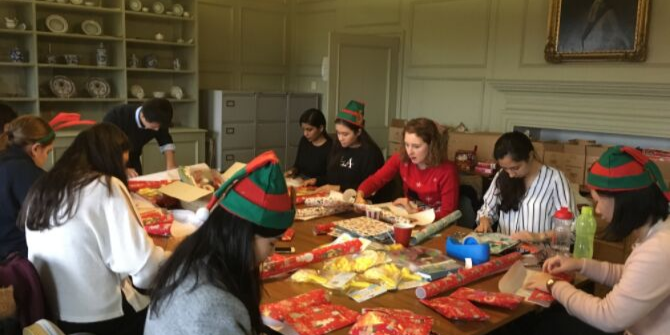Abi Williams (BSc in Politics and History, 2022) has been volunteering in her spare time as a Peer Supporter. Peer Supporters are trained student volunteers who can offer support, give a fresh perspective and listen to whatever is troubling students. In this blog, she reflects on what she has learnt from her time volunteering and how it has changed her LSE experience.
I didn’t begin to focus on my mental health until it began to affect me personally. My first year of university was a whirlwind experience – I was living away from my family for the first time, studying subjects and concepts I had never come across before, and meeting people from all over the globe. At first, I was thriving in this environment, but as the excitement of being a fresher began to fade and the workload began to increase, I was starting to feel out of my depth. I started experiencing symptoms of anxiety and became increasingly isolated. This went on for a few months, and it wasn’t until my friends and family started to notice that something wasn’t quite right, that I was able to get the help that I needed.
One of my close friends recommended that I book an appointment with the LSE counselling service. I had never really heard of it before – I understood the concept of it, but counselling, as well as mental health, had always been a bit of a taboo in the communities that I grew up in. Despite my apprehensions, I went into my appointment and after talking to one of the counsellors, I felt like a weight had been lifted off of my shoulders.
It was this intersection between community and counselling that really helped me get through what was a difficult time and, after working on my own mental health, I decided that I wanted to help other students who were going through something similar to me.
During the summer of my first year, one of my friends sent me the link to the Peer Support application form. The deadline was less than 24 hours away, but after reading about the scheme, I knew that I had to apply. The Peer Support scheme is founded on the idea of students helping students. The students on the scheme undergo training learning more about mental health as well as the different ways that we can support the students who reach out for help.
I often think back to the first time a student reached out to me for help. Although we had been trained, and had practised facilitating conversations with students, I still felt worried that I might say the wrong thing, or not be able to help. However, once we began speaking, I realised that it wasn’t about the advice that I could give, or the solutions that I could propose, but rather the ability to be a listening ear. I think this has been one of the most valuable things that I have been able to take from my time as a Peer Supporter. Being able to listen to other people, and be attentive to their needs, is something that I find has often crossed over into my daily life.
Beyond the conversations, I have also been able to be a part of different activities that the Peer Supporters host throughout the year – such as movie nights in halls and drop-in sessions on campus. One of my personal favourites were the stalls we put up outside the library throughout the academic year. Not only did this help promote the scheme on campus, but it was also a chance to talk to students across the LSE community and find out how they were doing. Oftentimes, what started as simply offering a student a piece of chocolate or fruit, would end in a discussion about how they were feeling, or a word of encouragement to help them get through a tough essay. I think this was another really rewarding part of the scheme for me. In the moments where I felt tired or drained, speaking to someone who had reached out for help, or helping out on one of the stalls, actually made me feel more energetic and hopeful about the rest of the term.
Volunteering as a peer supporter has been one of the highlights of my LSE experience, not only did it teach me values and skills that I’ll take forward with me long after I graduate, but it also allowed me to connect with students who have the same passion for mental health, and helping other students, that I do.
If Abi has inspired you to volunteer, check out one of our other ongoing opportunities or book a one-to-one with David Coles, the Volunteer Centre Manager if you have more questions. And why not follow us on Twitter, and Instagram to stay up-to-date with our events and opportunities and read our blog for more volunteering tips and stories.





